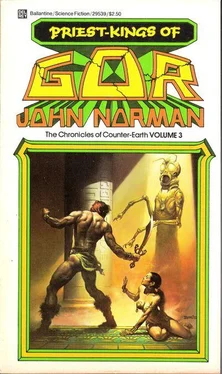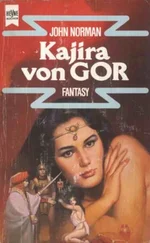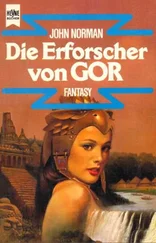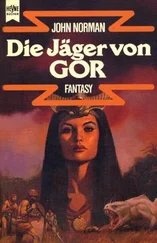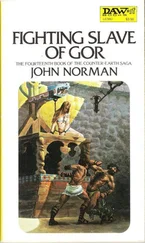“He is an impostor,” said one of the Initiates.
“He must dies,” said another.
I hoped that those humans who returned from the Nest would not be hunted by Initiates and burned or impaled as heretics and blasphemers.
Perhaps they would simply be treated as fanatics, as daft homeless wanderers, innocent in the madness of their delusions. Who would believe them? Who would take the word of scattered vagrants against the word of the mighty Caste of Initiates? And, if he did believe them, who would dare to speak out that he did so?
The Initiates, it seemed, had conquered.
I supposed many of the humans might even return to the Nest, where they could live and love and be happy. Others, perhaps to keep the skies of Gor over their head, might confess to deceit; but I suspected there would be few of those; yet I was sure that there would indeed be confessions and admissions of guilt, from individuals never within the Sardar, but hired by Initiates to discredit the tales of those who returned. Most who had returned from the Sardar would, eventually at least, I was sure, try to gain admittance in new cities, where they were not known, and attempt to work out new lives, as though they did not keep in their hearts the secret of the Sardar.
I stood amazed at the greatness and smallness of man.
And then with shame I realised how nearly I myself had come to betraying my fellow creatures. I had intended to make use of that moment myself, pretending to have come with a message from Priest-Kings, to encourage man to live as I wished him to live, to respect himself and others, to be kind and to be worthy of the heritage of a rational animal, and yet of what worth would these things be if they came not from the heart of man himself, but from his fear of Priest-Kings or his desire to please them? NO, I would not try to reform man by pretending that my wishes for him were the wishes of Priest-Kings, even though this might be effective for a time, for the wishes that reform man, that make him what he is capable of becoming, and has not yet become, must be his own and not those of another. If man rises, he can do so only on his own two feet.
And I was thankful that the High Initiate of Ar had interfered.
I thought how dangerous might be the Initiates if, intertwined with their superstitious lore and their numerous impressive ceremonies, there had been a truly moral message, something that might have spoken to the nobility of men.
The High Initiate of Ar gestured to the others who crowded about, pressing in on me.
“Stand back,” he said, and he was obeyed.
Sensing that he wished to speak to me I asked Vika to withdraw somewhat, and she did so.
The High Initiate of Ar and myself regarded one another.
Suddenly I did no feel him as an enemy any longer and I sensed that somehow he did not regard me either as a threat or foe.
“Do you know of the Sardar?” I asked him.
“Enough.” he said.
“Then why?” I asked.
“It would be hard for you to understand,” he said.
I could smell the smoke from the burning thigh of the bosk as it hissed and popped on the sacrificial fire.
“Speak to me.” I said.
“With most,” he said, “it is as you think, and they are simple, believing members of my caste, and there are others who suspect the truth and will pretend — but I, Om, High Initiate of Ar, and certain of the High Initiates are like none of these.”
“And how do you differ?” I asked.
“I — and some others —” he said, “wait for man.” He looked at me. “He is not yet ready.”
“For what?” I asked.
“To believe in himself,” said Om, incredibly. He smiled at me. “I and others have tried to leave open the gap that he might see and fill it — and some have — but not many.”
“What gap is this?” I asked.
“We speak not to man’s heart,” said Om, “but only to his fear. We do not speak of love and courage, and loyalty and nobility — but of practice and observance and the punishment of the Priest-Kings — for if we so spoke, it would be that much harder for man to grow beyond us. Thus, unknown to most members of my caste, we exist to be overcome, thus in our way pointing the way to man’s greatness.”
I looked at the Initiate for a long time, and wondered if he spoke the truth. These were the strangest things I had heard from the lips of an Initiate, most of whom seemed interminably embroiled in the rituals of their caste, in the arrogance and archaic pedantry of their kind.
I trembled for a moment, perhaps from the chill winds sweeping down the Sardar.
“It is for this reason,” said the man, “that I remain and Initiate.”
“There are Priest-Kings,” I said at last.
“I know,” said Om, “but what have they to do with what is most important for man?”
I thought about it for a moment. “I suppose,” I said, “— very little.”
“Go in peace,” said the Initiate, stepping aside.
I extended my hand to Vika and she joined me.
The High Initiate of Ar turned to the other Initiates about.
He raised his voice. “I saw no one emerge from the Sardar,” he said.
The other Initiates regarded us.
“Nor did I,” said several of them.
They parted, and Vika and I walked between them, and through the ruined gate and palisade which had once encircled the Sardar.
Chapter Thirty Four
MEN OF KO-RO-BA
“MY FATHER!” I CRIED. “My father!”
I rushed to the arms of Matthew Cabot who, weeping, caught me in his arms and held me as though he might never let me go.
Once again I saw the strong, lined face, that square jaw, that wild, flowing mane of fiery hair so much like my own, that spare, ready frame, those gray eyes, now rimmed with tears.
I felt a sudden blow on my back and nearly lost my breath and twisted to see the gigantic brawny Older Tarl, my former Master at Arms, who clapped me on the shoulders, his hands like the talons of tarns.
There was a tugging at my sleeve and a blubbering and I looked down and nearly poked a scroll in my eye which was carried by the small blue-clad figure at my side.
“Torm!” I cried.
But the little fellow’s sandy hair and pale, watery eyes were hidden in the vast sleeve of his blue robe as he leaned against my side and wept unabashedly.
“You will stain your scroll,” I cautioned him.
Without looking up or missing a sob he shifted the scroll to a new position under his other arm.
I swept him off his feet and spun him around and the robes flew from his head and Torm of the Caste of Scribes cried aloud in joy and that sandy hair whoofed in the wind and tears ran sideways down his face and he never lost hold of the scroll although he nearly batted the Older Tarl with it in one of his orbits and then he began to sneeze and I gently put him down.
“Where is Talena!” I begged my father.
Vika, as I scarcely noted, stepped back when I had said this.
But in that instant my joy was gone, for my father’s face became grave.
“Where is she!” I demanded.
“We do no know,” said the Older Tarl, for my father could not bring himself to say the words.
My father took me by the shoulders. “My son,” he said,” he said, “the people of Ko-ro-ba were scattered and none could be together and no stone of that city might stand upon another stone.”
“But you are here,” I said, “three men of Ko-ro-ba.”
“We met here,” said the Older Tarl, “and since it seemed the world would end we decided that we would stand together one last time — in spite of the will of Priest-Kings — that we would stand together one last time as men of Ko-ro-ba.”
I looked down at the little scribe, Torm, who had stopped sneezing, and was now wiping his nose on the blue sleeve of his robes. “Even you, Torm?” I asked.
Читать дальше
